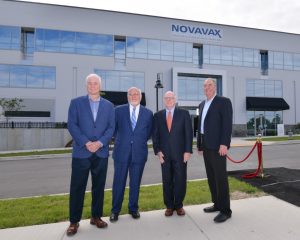
How the BioHealth Capital Region, Philadelphia, and Research Triangle Park are Backing the White House Cancer Moonshot Initiative
By Alex Keown
June 6, 2023
It takes a community to take on something as big and diverse as cancer, and that’s what is happening across the BioHealth Capital Region, Research Triangle Park and Greater Philadelphia. Companies and academic institutions throughout these regions are coming together and pooling their resources and intellectual prowess to strategize new manners of treating and preventing cancer in its many different forms.
In 2022, President Joe Biden reignited an effort to accelerate the development of oncology treatments six years after first launching the Cancer Moonshot program when he served as vice president in a previous administration. The mission set an ambitious goal, reduce the death rate from cancer by at least 50% over the next 25 years, and improve the experience of people and their families living with and surviving cancer.
In his announcement, President Biden noted that over the past two decades, researchers have delivered numerous precision cancer treatment that target specific mutations and have also provided new immuno-therapeutic approaches that harness the body’s immune system to detect and kill cancer cells. The scientific community also delivered a cancer vaccine for the human papilloma virus that can prevent up to seven different forms of cancer. Biden said these advances are paving a way for improved treatments that can achieve the moonshot’s goal.
Cancer is the second leading cause of death in the United States. The president’s call has echoed across the life sciences space, with multiple companies and organizations answering the ambitious presidential appeal. BioBuzz takes a look at a few of the initiatives in our local markets that are supporting this audacious project.
BioHealth Capital Region Support
In Maryland, former Gov. Larry Hogan announced a moonshot initiative backed by $216 million in initial investment to support oncology research and a comprehensive cancer center in Prince George’s County. The Maryland Cancer Moonshot will leverage the state’s public health facilities to expand early detection, screening, and patient education; advance state-of-the-art inpatient and outpatient care services; and support cutting-edge research of cures and treatments.
The state committed $100 million to support an expansion of the University of Maryland Medical System’s Greenebaum Comprehensive Cancer Center in Baltimore. The Greenebaum is a National Cancer Institute-designated comprehensive cancer center. Each year the center treats approximately 3,000 new patients. Another $67 million was earmarked for the Prince George’s Comprehensive Cancer Center, which is on the campus of the University of Maryland Capitol Region Medical Center in Largo. The funding also includes $25 million for the University of Maryland School of Medicine and Johns Hopkins University to accelerate cancer research projects; $20.5 million for TEDCO’s Maryland Stem Cell Research Fund; and $2.5 million for the Maryland Tech Council’s BioHub Maryland Initiative.
Elmer Huerta, director of the Cancer Preventorium at the George Washington University Cancer Center, took part in the White House Cancer Moonshot Colorectal Cancer Forum in March 2023. Huerta has had a long and distinguished career battling cancer for more than 30 years. In 1994 Huerta founded the Cancer Preventorium at the MedStar Washington Hospital Center Cancer Institute, a low-income clinic in Washington, D.C. The center is focused on preventative health in order to early detection of cancer, diabetes and heart disease. Huerta also served as the principal investigator for the Latin American Cancer Research Coalition, a National Cancer Institute. In 2013 Huerta was recognized by the White House as “Champion of Change in Public Health and Prevention” and received the Medal of Honor by the Peruvian Congress.
On the more local level, the BioHealth Capital Region continues to welcome powerhouse companies to the area that share in the relentless pursuit of fighting cancer. For example, Kite Pharma, which within recent years has set up a large manufacturing facility in Frederick, Maryland, is continuing to expand its CAR T-cell manufacturing operations, providing not just hope for patients, but exciting job opportunities to fuel the region’s workforce. More and more life science incubators have also been popping up across the region, including Frederick-based I-270 and FITCI, as well as JLABS @ Washington, DC, to help support up-and-coming startups working in oncology and other diseases.
Philadelphia
In 2022, the Perelman School of Medicine at the University of Pennsylvania secured a five-year, $5.7 million grant from the National Cancer Institute for a new research center that will develop and assess advanced methods of telehealth delivery for cancer care with a focus on promoting health equity. According to the university, the grant will finance the “design and testing of new telehealth strategies across the lung cancer care continuum, from screening to molecular testing to survivorship, with an emphasis on lung cancer morbidity and mortality, health disparities, and the digital divides.” The funds are also expected to provide incentive for additional research on telehealth’s impact on patient outcomes.
In May 2022, the Children’s Hospital of Philadelphia announced a computational platform capable of discovering tumor antigens developed in partnership with the University of California at Los Angeles. The platform was developed with financial support from the moonshot program. The computational platform dubbed IRIS (Isoform peptides from RNA splicing for Immunotherapy target Screening) is designed to discover tumor antigens derived from alternative RNA splicing, expanding the pool of cancer immunotherapy targets.
In a paper published in the Proceedings of the National Academy of Sciences, Yi Xing, director of the Center for Computational and Genomic Medicine at CHOP, said the platform is able to identify immunotherapy targets that arise from alternative splicing, which provides a broad framework for the discovery of novel cancer immunotherapy targets.
RTP Support
In May, Durham, N.C.-based Science 37 partnered with DiMe and Moffitt Cancer Center as part of CancerX, a new public-private partnership effort to rapidly accelerate the pace of cancer innovation in the U.S. CancerX, part of the moonshot effort, was announced in February 2023. This initiative is expected to bring multiple partners together to accelerate oncology innovation.
Science 37, which is focused on providing universal access to clinical research through its Metasite platform, will work with the CancerX project team and participating clinical trial sponsors on the inaugural project, “Advancing Digital Innovation to Improve Equity and Reduce Financial Toxicity in Cancer Care and Research.” This project will further advance remote conduct in oncology trials, including precision medicine, early cancer detection, and long-term follow-up for cell and gene therapy.
This program is expected to unleash the power of digital innovation to democratize access to better quality health and economic outcomes after cancer treatment for a broader coalition of patients. Shaalan Beg, vice president of oncology at Science 37 said the company’s virtual Metasite is improving access and equity in clinical trials.
“From breast cancer studies requiring at-home administration of anticancer treatment every three weeks that significantly reduced patient burden, to early detection cancer studies where we’ve enrolled more than 24% minority representation with 25,000+ medical records collected; the pace of progress in oncology research that our Metasite enables is unparalleled,” Beg said in a statement.
Chimerix Chief Technology Officer Joshua Allen took part in the White House’s May 25 Cancer Moonshot Brain Cancer Forum. That program attempts to align strategies that could improve treatment outcomes for patients with diffuse intrinsic pontine glioma (DIPG), an aggressive tumor of the brainstem, as well as glioblastoma multiiforme, a type of brain cancer that has a high mortality rate if left untreated.
Durham-based Chimerix is developing ONC201, a precision medicine focused on treating brain tumors with H3 K27M-mutations. Following positive Phase II data, the company is currently enrolling for a Phase III clinical trial. Data showed ONC201 provides a “potentially meaningful overall survival advantage” for glioma patients in the recurrent setting. ONC201 is the first member of Chimerix’s imipridone class of anti-cancer small molecules which selectively targets Dopamine Receptor D2 (DRD2) and ClpP.
In a brief statement ahead of the White House conference, Chimerix CEO Mike Sherman said he hopes the company’s participation will lead to the identification of new actions that “can accelerate progress, resulting in better outcomes for patients with brain cancer.”
The Duke University Cancer Institute joined the Cancer Moonshot initiative with a focus on breast and gynecological cancers. Researchers affiliated with the university have participated in multiple panel discussion, such as the White House Cancer Cabinet Community Conversation on Breast and Gynecologic Cancer. Part of the Duke team’s focus was on improved screening efforts for cervical cancers. Citing the American Cancer Society, 50% of cervical cancer diagnoses are found in people who were never screened, while 10% of diagnoses are in under-screened individuals. There’s been a more than 50% decrease in cervical cancer incidence and mortality over the past three decades, largely due to screening. The Duke-supported team wants that momentum to continue.








